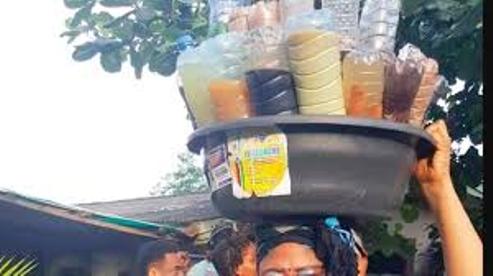
LAGOS JANUARY 5TH (NEWSRANGERS)- “I almost died with my three children after taking ‘agbo’ meant to treat malaria and typhoid fevers. My children vomited and went pale. Their skins turned black,” says Dr. Chinemerum Okafor.
This young doctor was reacting to a situation that would have led to the death of her children and, perhaps, led to her family break up after buying a bottle of over hyped herbal medical concoction in a public bus while traveling to Onistsha. She is one of the few medical practitioners who believe that with their synthetic drugs, there are also natural drugs which has to do with herbs and root, but the near death experience has made her to reconsider her stance on the efficacy of the local concoctions called Agbo in the Yoruba speaking South West and different names in other parts of the country.
“While on our way to Onitsha from Lagos to meet my husband and to drop my children with my mother-in-law in the village for holiday, I met with these herbal drugs dealers,” she said. According to her, after advertising their products, she decided to buy one, which the dealers said was good for the treatment of malaria, high blood sugar and Typhoid fever believing it was the same herbal mixtures that her mother in law used to prescribe for her while she was in the medical school.
“To test its efficacy, after a while, I opened it, took some and gave to my two children who were travelling with her but the smooth journey became a tortuous one with experience that almost made me mad.” She continued, “Few minutes into our journey, I became dizzy; it appeared as if something entered by stomach and was turning my intestines up and down. Breathing became difficult for me. “Already my children had started vomiting, crying for help and holding their tummy. I was crying in my own pain because I thought I was going to kill my children with my own hands. It was a terrible moment and situation.
“I thought I was going to lose them. We were terrified and other passengers started looking for solution. Some said we should take coconut water to reduce the effect of the medicine on us, others said red oil.” They tried a number of stuffs to salvage the situation but the vomiting never ceased, instead it graduated to stooling and diarrhorea and the children went pale with their eyes sunk into the eye sockets like ones who have passed out every water in them. She continued: “The driver being nice stopped when called upon to do so. We continued our journey in this pain and tension for those sympathizers who thought something worse was going to happen. They inconvenienced themselves to ensure that we were fine until we got home.
“On getting home, the skins of my both children were already dark. I was so scared that my husband, their father, was going to deal with me but the moment we arrived home, he hurriedly rushed us to the nearby hospital where we regained our strength and health. “Also, while we were going through this pain, I had already thrown the remaining agbo in the bottle out of the vehicles. And that was the day I said no to these local herbal concoction.” Dr. Okafor, who used to be an advocate of herbal mixtures lost her voice with this situation, saying she can’t recommend it for anybody as she has lost faith in these native herbal concoction being hawked all over the country. “I felt disappointed.
Today, I speak against it and it will never find its way to my house again. I really do not know what went wrong with that agbo but whatever the situation is that experience worth not having again” she quipped. There are many people other Nigerians who believe so much in the power and efficacy of agbo, or whatever it’s called in other native names. In the west, they start their day with agbo and probably end with it. More so, in some areas, these native herbal concoctions are fast losing their popularity and patronage due to activities of some informed Nigerians and unpleasant experiences many people who consumed them have. While those with nasty experience spread the news of its poisoning potential, others are still going to ‘Agbo’ joints. Agbo,’ the Yoruba name for herbal medicines, is a concoction prepared from a variety of herbs and roots; it is one of the most popular herbal preparations taken for various ailments, especially by the native Yoruba people.
Though this concoction is Yoruba origin, yet other tribes patronise it. Agbo can be soaked in water, alcohol or even palmwine before it is taken. According to Dr. Cynthia Obiora, those local herbs should be taken with care, saying that the type they used ethanol for its extraction is referred to as ethanolic extraction while the type they used water for is referred to as aqueous extraction. She said, “What Agbo sellers try to do is to extract phytochemical from these plants and give it to the public without adequate laboratory screening to ascertain the dosage to be taken.
But no one even knows under what condition are those agbo jedis are prepared from. “There is the need to be careful with those herbs. An uncle of mine almost died from continuous diarrhea after consuming overdose of ‘agunmu jedi.’
We should be mindful of whatever we intend to consume whether herbal or not. “These herbal concoctions had caused some to suffer adverse allergic reactions. I hope we will refrain from agbo sales’ centres.” The expert warned that some of the adverse effects one experiences after consuming Agbo, are due to the toxic substances or unprocessed materials used in the production of the concoction. “I believe what most people refer to as ‘Jedi jedi’ is hemorrhoid which is also called pile but as opposed to general belief, they are not caused by the consumption of refined sugar or sweet substances.
“The exact causes are still yet unknown, however, there are certain predisposing factors to it, and such factors include the consumption of low fiber diet, chronic constipation and also conditions that increase the intra-abdominal pressure such as presence of an intra-abdominal mass or pregnancy,” she added. According to the World Health Organisation (WHO), traditional medicine is generally available, affordable, and commonly used in large parts of Africa, Asia, and Latin
America. WHO estimates that about 80 per cent of the population in developing countries still depends on traditional medicine for their Primary Healthcare (PHC) needs. However, this percentage may vary from country to country. More so, experts have raised concerns on the after effects of taking Agbo, especially over a long period of time. One of such concerns is that it can damage the kidney and liver; also, there are concerns on its preparation which include the handling, dosage requirement for each ailment, shelf life and expiration date. Last year, at an event to commemorate the 2019 World Kidney Day on March 14, experts raised awareness on the importance of guarding against acts which can lead to kidney disease.
At the event organised by the Renal Dialysis Centre (RDC), Allen Avenue, Ikeja, Lagos, experts harped on the need to reduce or desist from consuming local concoctions, especially Agbo because of the possible resultant effects. A nephrologist, Dr Chinedu Odum, said: “In this environment, we talk about herbs and we hear many people say they take Agbo or herbs.
They say the herbs clean their system but the truth is that these concoctions people are taking, some of them have bad effect on the kidney. It can damage the kidney “It is a lot cheaper to prevent kidney damage because once you have kidney damage there is no going back; even those who are rich can’t maintain, afford or keep up with dialysis or transplant not to talk of the masses who are not generally or financially equipped to take care of the disease.
“So, we want to implore people to be aware of kidney disease but more importantly, to be more aware of the factors that increase the illness.” For the Lagos State Ministry of Health, the locally made herbal concoction such as Agbo, Sepe and the likes of them are not purified or refined nor do they carry information on the active ingredients or the amount of such ingredients in them.
The Ministry, through Dr. Sunkanmi Ibraheem, said the health benefits of these concoctions are scientifically questionable because there is not known scientific evidence or studies to validate their widely claimed therapeutic or curative effect, which is a direct opposite to the practice of conventional medicines, where drugs extensively studied and shown to be safe within their regulated dosage regime. He said: “Concerning herbal bitters, it is a herbal alcoholic or non-alcoholic drink. It is not a form of treatment of any medical condition.
News Telegraph










